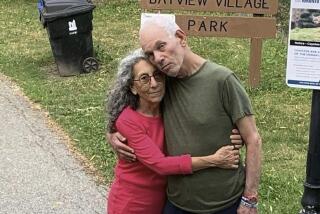Judah Nadich, 95; rabbi aided Jews from WWII camps
- Share via
NEW YORK -- Rabbi Judah Nadich, a military chaplain who advised then-Gen. Dwight D. Eisenhower on Jewish affairs after the liberation of Nazi concentration camps in Europe in the last months of World War II, has died at 95.
Nadich died of a heart attack at his Manhattan home on Aug. 26, according to his grandson, Natan Meir.
Nadich was the Army’s senior Jewish chaplain in Europe in April 1945 as advancing American and British forces liberated Nazi concentration camps in Germany.
Eisenhower, the commander of Allied forces in Western Europe, named Nadich to the new post of Jewish advisor to recommend policies for hundreds of thousands of displaced people being kept in military custody in squalid conditions little better than the camps they had survived.
In a 1953 book, “Eisenhower and the Jews,” Nadich wrote that survivors of the Holocaust were living in deplorable conditions in camps surrounded by barbed wire. Food stocks were scarce and overcrowding was rampant. In contrast, the conquered German troops had complete freedom.
Nadich wrote that he and others persuaded the Allied command to abandon a policy requiring the displaced people to be returned to their home countries.
By August 1945, he wrote, the basis was laid “for a new American policy toward Jewish displaced persons and for an entirely new attitude toward them” that would eventually be implemented at lower levels.
In addition to his military service, Nadich was noted as an early supporter of the civil rights movement and as an advocate of equality for women in Jewish religious ceremony, including their ordination as rabbis.
Born in Baltimore on May 13, 1912, Nadich was the oldest of four children of Russian immigrants. A Conservative rabbi, he served congregations in Buffalo and Chicago before joining the U.S. Army as a chaplain in 1942.
Nadich became rabbi at New York’s Park Avenue Synagogue in 1957, a post he held until retirement in 1987. In a sermon in 1960, he spoke out against racial segregation, saying that “freedom is colorblind” and that it was a “sacred obligation” to help all who seek it.
In 1974 he urged the Rabbinical Assembly, an international association of Conservative rabbis of which he was then president, to give “careful consideration” to allowing women to become rabbis. The first female rabbi was ordained by the Jewish Theological Seminary, a Conservative center, in 1985.
Nadich is survived by his wife, Martha; a sister, three daughters and eight grandchildren.
More to Read
Sign up for Essential California
The most important California stories and recommendations in your inbox every morning.
You may occasionally receive promotional content from the Los Angeles Times.













